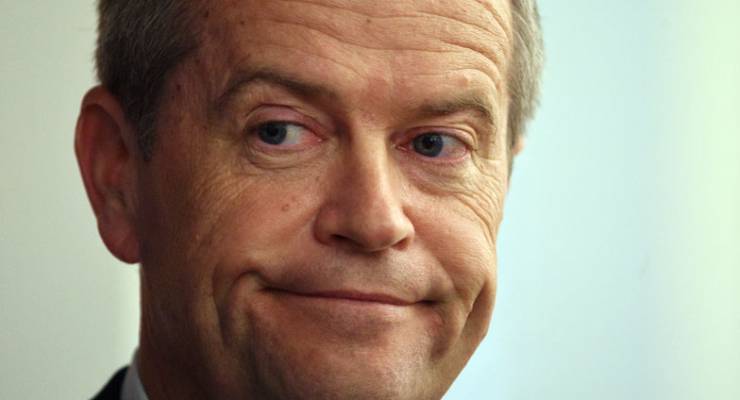
The major parties remain locked at 50-50 according to today’s Essential Report, but Labor’s vote is up and there is widespread support for a royal commission into the banking sector.
With the country now effectively in campaign mode as we head toward a July 2 election, Labor’s primary is up a point to 36% and the Greens remain on 11% while the Coalition remains on 42% for an unchanged two-party preferred outcome of 50%-50%.
And as the government scrambles to put together a package to head off Labor’s call for a banking royal commission, 59% of voters support Labor’s proposal, compared to just 15% who oppose it. However, support drops to 54% when the question is framed as Labor’s proposed royal commission, which is opposed by the government on the basis that banks are already heavily regulated.
Unsurprisingly, Coalition voters are less likely to support the proposal — support falls 17 points — but interestingly, Labor voters’ support for the proposal also falls by five points to 68% (possibly suggesting they’re influenced by the idea that banks are heavily regulated now), while Greens support rises 13 points and “other” support goes up four points (both are small sample sizes). But even when framed in a partisan way and with the note that banks are already heavily regulated, 41% of Coalition voters back a royal commission, compared to 38% who oppose one.
And the government’s thought bubble of a high-speed rail system, which came and went within hours last week, leaves voters cold: 28% say it should be a high priority, compared to 37% who say it should be a medium priority and 27% who say it should be a low priority. Instead, 33% of voters rate “more suburban rail lines” as a high priority; 41% rate it a medium priority and only 17% a low priority. There’s also more support for more freeways (29% say it’s a high priority) and building regional rail lines (28% regard that as a high priority and 44% a medium priority); 20% believe more cycleways is a high priority.

Voting intention also affects such views in unpredictable ways. While Greens voters, adhering to the cliche, are much more likely to support cycle paths, Coalition voters are significantly more likely to support high-speed rail (37% high priority, compared to 31% for Greens voters) as well as freeways and suburban rail lines, while Labor voters are cooler on the idea of high-speed rail, with 25% seeing it as a high priority.
Essential also asked a series of questions about generational opportunity. Asked if people under 35 have more or fewer opportunities compared to previous generations, 36% said more, 30% said fewer and 21% said the same. There were no gender differences but age, inevitably affected responses: voters over 55 were more likely to say the young had more opportunities and younger voters to say they had fewer, but some older voters also felt the young had fewer opportunities (32%, compared to 34% of people under 35). That’s because older voters were far more definite in their opinions, with far fewer answering “don’t know”.
Older voters, unsurprisingly, believed retirees didn’t receive enough support from the government (66%, compared to 47% of under 35s and 55% of 35- to 54-year-olds); very few voters (7%) think retirees receive too much support. But the generations are united in the view that it’s much harder for young people to buy a house (76%) than a generation ago, with 56% saying it’s much harder. And there’s no difference between generations either on the issue of jobs, with 55% agreeing it’s harder for young people to find a well-paying job compared to previous generations.








The government is run by a former merchant banker.
Why would he want his own practices investigated?
Since apparently you’re one of the Crikey faithfuls Bill Morton it’s easy to know why you don’t understand how quaint your question is.
It was the Abbott government that planned to enshrine financial advice practices now before the courts, only to be derailed by the cross benchers. Of course they don’t want the sector laid bare for all to see.
It’s a refreshing change sang froid to find a subscriber who understands what chicanery the cross benchers will engage in to save their perks and lurks.
The fact that the previous admin wanted to gut the Labor FSA reforms tells all that we need to know about where, whose sympathies, intentions and actions lay.
However, don’t bet on Labor having the guts to take on the really BigAr$ed end of town – why would they?
I think this headline is misleading…there is still 54% support for LABOR’S Royal Commission. That was a majority when I went to school.
Anyway, why would you ask this question if not to make trouble? It doesn’t make any difference who sets up this RC…it desperately needs to happen, and a majority of respondents recognise this.
It’s little wonder anonymous CML that so many outside the Crikey Bunkers share your inability to understand why the Union/Greens/ALP Power Brokers disingenuous prattle wasn’t about genuinely needed or useful reforms.
“But the generations are united in the view that it’s much harder for young people to buy a house (76%) ”
My take out from this is that 24% of people are living in cloud cuckoo land, or on some desperately good mind altering drugs. What’s the likelihood that all of that 24% are well over 65 and have voted LNP all their lives?
Seriously, if these people were asked if water is wet, they’d get it wrong.